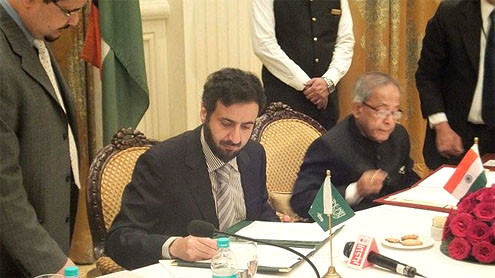 The Saudi Arabian business mission to India led by the new Commerce and Industry Minister Tawfiq Al-Rabiah has proved a great success with both sides speaking of the enormous potential, in terms of boosted business between the two countries.
The Saudi Arabian business mission to India led by the new Commerce and Industry Minister Tawfiq Al-Rabiah has proved a great success with both sides speaking of the enormous potential, in terms of boosted business between the two countries.
This turnaround is a direct consequence of New Delhi’s decision, in the days leading up to the mission’s arrival, to lift a controversial punitive duty on part of our petrochemical exports.Trade spats are rarely productive. In November 2010, India imposed a 6.5-percent duty on polypropylene supplies from Saudi Arabia on the grounds that the Kingdom was dumping the product at uncommercial prices. The result was a cooling in bilateral trade relations that did neither country any good.
Thankfully, this issue is now in the past and both sides can get on with the serious business of doing business. Each has much to offer the other. The Kingdom is in a position to bring India both investment capital and oil and petrochemical products. As it is, India already imports fully 23 percent of its crude oil from Saudi Arabia.India for its part has the potential to become a key supplier of technology and know-how. As its companies expand internationally, there is a hunger for new commercial opportunities. These the Kingdom can supply in abundance.
From a balance of trade point of view, it never made sense for New Delhi to inhibit commercial relations. Two-way trade between our countries totaled $25.62 billion in 2010/11, of which the lion’s share, $20.38 billion, accrued to the Kingdom. India’s exports to us were a mere $5.22 billion. That is not, however, the whole story. There are two million Indians living and working in Saudi Arabia. Their remittances back home make a considerable contribution to India’s foreign currency flows. Indeed, one of the issues addressed during the Saudi trade mission has been a relaxation and streamlining of visa procedures, to encourage easier movement between the two countries. The Indians are, for instance, keen to attract more Saudi tourists as well as businessmen.
There are currently some 50 Saudi companies that have made investments in India; they total some $230 million. Yet oddly perhaps, given the Kingdom’s available investment capital, so far it is Indian companies that have made a greater investment in our economy. Thus there are 230 Indian companies active here which have invested a total of some $1.2 billion.
The hard truth is that India needs foreign investment and the Kingdom provides an attractive, politically neutral source, as well as a highly alluring market. It may have been no coincidence that as the Saudi mission began its work in India, New Delhi announced the end of a ban on direct foreign investment in the country’s stock market. India’s economic miracle is real enough, but it is in danger of stalling as the government of Prime Minister Manmohan Singh struggles to implement long-overdue economic reforms. Without the necessary restructuring, India will not attract the long-term direct and indirect investments that can lift its economy to the next powerful level.
As the collapse last month of legislation permitting foreign retailers to enter the Indian market demonstrated, there will be little chance of crucial international investment flows in a country that is still protectionist. Worse, many leading Indian companies are turning their backs on their domestic market in favor of easier and more profitable investments overseas.India still has a lot of work to do to capitalize on the commercial genius that has been released in the country in the last 25 years. Saudi Arabia is now in a position to play a potentially significant role by boosting bilateral trade.
Six years ago this month Custodian of the Two Holy Mosques King Abdullah opened the doors to a new and potentially exciting political, economic and energy relationship with India during his state visit as guest-of-honor for the country’s Republic Day celebrations. The “Delhi Declaration” signed during the visit indeed saw significant growth in bilateral trade over the next four years. Relations were further boosted when, at the end of February 2010, Manmohan Singh made the first visit to the Kingdom by an Indian prime minister in 28 years. Unfortunately, the goodwill generated by that visit was impeded by the polypropylene row later that year.Now hopefully our relations are back on an even keel and a mutually profitable course.












